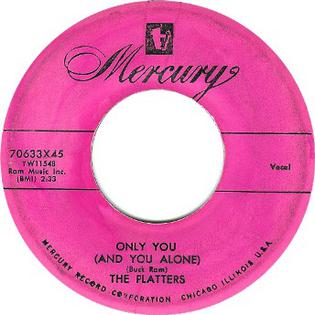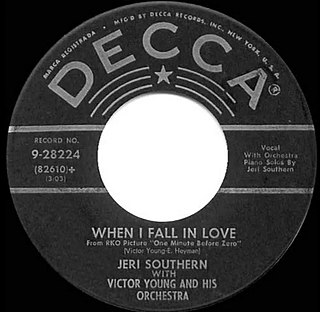
Clara Ann Fowler, known professionally as Patti Page, was an American singer and actress. Primarily known for pop and country music, she was the top-charting female vocalist and best-selling female artist of the 1950s, selling over 100 million records during a six-decade-long career. She was often introduced as "the Singin' Rage, Miss Patti Page". New York WNEW disc-jockey William B. Williams introduced her as "A Page in my life called Patti".

"Only You " is a pop song composed by Buck Ram. It was originally recorded by The Platters with lead vocals by Tony Williams in 1955.

"Rock and Roll Music" is a song written and recorded by Chuck Berry. It has been widely covered and is one of Berry's most popular and enduring compositions.

"When I Fall in Love" is a popular song, written by Victor Young (music) and Edward Heyman (lyrics). It was introduced in the film One Minute to Zero as the instrumental titled "Theme from One Minute to Zero". Jeri Southern sang on the first vocal recording released in April 1952 with the song's composer, Victor Young, handling the arranging and conducting duties. The song has become a standard, with many artists recording it; the first hit version was sung by Doris Day released in July 1952.

"You Send Me" is a song written and originally recorded by American singer Sam Cooke, released as a single in 1957 by Keen Records. Produced by Bumps Blackwell and arranged and conducted by René Hall. The song, Cooke's debut single, was a massive commercial success, becoming a No. 1 hit on both Billboard's Rhythm & Blues Records chart and the Billboard Hot 100.

Billy Wayne "Crash" Craddock is an American country and rockabilly singer. He first gained popularity in Australia in the 1950s with a string of rockabilly hits, including the Australian number one hits "Boom Boom Baby" and "One Last Kiss" in 1960 and 1961 respectively. Switching to country music, he gained popularity in the United States in the 1970s with a string of top ten country hits, several of which were number one hits, including "Rub It In", "Broken Down in Tiny Pieces", and "Ruby Baby". Craddock is known to his fans as "The King Of Country Rock Music" and "Mr. Country Rock" for his uptempo rock-influenced style of country music.

"Walkin' After Midnight" is a song written by Alan Block and Don Hecht and recorded by American country music artist Patsy Cline. The song was originally given to pop singer Kay Starr; however, her label rejected it. The song was left unused until Hecht rediscovered it when writing for Four Star Records. Originally Cline was not fond of "Walkin' After Midnight", but after making a compromise with her label she recorded it. However, the first released recording was by Lynn Howard with The Accents, released August 1956.

"It's Only Make Believe" is a song written by drummer Jack Nance and Mississippi-born singer Conway Twitty, while both were touring across Ontario, Canada in 1958. The song was recorded on May 7 for MGM Records; produced by Jim Vienneau, it featured Floyd “Lightnin’” Chance on double bass. It was released on side B of "I'll Try" on July 14, 1958. Known as Harold Lloyd Jenkins until changing his name in 1957, Twitty was a relatively unknown rock n' roll singer at the time. That all changed when side B finally hit the chart in September, then made No. 1 twice, on November 10 and 24. The single topped both U.S. and the UK Singles Chart, and became the only No. 1 pop single of his career. Years later, on a segment of 'Pop Goes The Country', Twitty stated it was a hit in 22 countries, and sold over 8 million copies. He did not become a country music star until he crossed over in 1966.

"Help Me Make It Through The Night" is a country music ballad written and composed by Kris Kristofferson and released on his 1970 album Kristofferson. It was covered later in 1970 by Sammi Smith, on the album Help Me Make It Through the Night.
"Young Love" is a popular song, written by Ric Cartey and Carole Joyner, and published in 1956. The original version was recorded by Ric Cartey with the Jiva-Tones on November 24, 1956. It was released in 1956 by Stars Records as catalog number 539 and one month later by RCA Records as catalog number 47-6751. Cartey's version never charted.
"He's Got the Whole World in His Hands" is a traditional African-American spiritual, first published in 1927. It became an international pop hit in 1957–58 in a recording by English singer Laurie London, and has been recorded by many other singers and choirs.
"That Lucky Old Sun " is a 1949 popular song with music by Beasley Smith and words by Haven Gillespie.
"The Story of My Life" is a song written by Burt Bacharach and Hal David. It was published in 1957. It was recorded by Marty Robbins and it reached number one on Billboard's country chart in 1958, and it became a number one hit song for Michael Holliday in the UK.
"Someday You'll Want Me to Want You" is a popular song published in 1944 by Jimmie Hodges. The song became a standard, recorded by many pop and country music singers.

"Oh Lonesome Me" is a popular song written and recorded in December 1957 by Don Gibson with Chet Atkins producing it for RCA Victor in Nashville. Released in 1958, the song topped the country chart for eight non-consecutive weeks. On what became the Billboard Hot 100, it peaked at No. 7. It was Gibson's only Top 10 hit on the pop chart. Its B-side was "I Can't Stop Loving You", which peaked at No. 7 on the C&W Jockey charts and became a standard song about unrequited love. The vocal backings on both songs were provided by the Jordanaires.
"City Lights" is an American country music song written by Bill Anderson on August 27, 1957. He recorded it on a small Texas label called TNT Records in early 1958 to little acclaim. The song was first cut by Anderson in 1957 at the campus of the University of Georgia. In June 1958, Ray Price recorded it and his version hit number 1 on the Billboard Hot Country Songs singles chart in August 1958. Mickey Gilley's version also hit number 1 in June 1975.
"Walking the Floor Over You" is a country music song written by Ernest Tubb, recorded on April 26, 1941 in Fort Worth, Texas, and released in the United States that year.
"I Don't Hurt Anymore" is a 1954 song by Hank Snow. It was written by Don Robertson and Jack Rollins.
"Rose Garden" is a song written in 1967 by American singer-songwriter Joe South. It was first recorded by Billy Joe Royal on his 1967 studio album Billy Joe Royal Featuring "Hush". Versions by South himself and Dobie Gray appeared shortly after the original. Gray's version became a minor hit in North America in 1969.

"Shake Me I Rattle " is a song written by Hal Hackady and Charles Naylor. It was originally recorded by The Lennon Sisters in 1957, but did not become commercially successful until a 1962 release by Marion Worth. It was later recorded in 1977 by Cristy Lane, who also had a major hit with the song.










